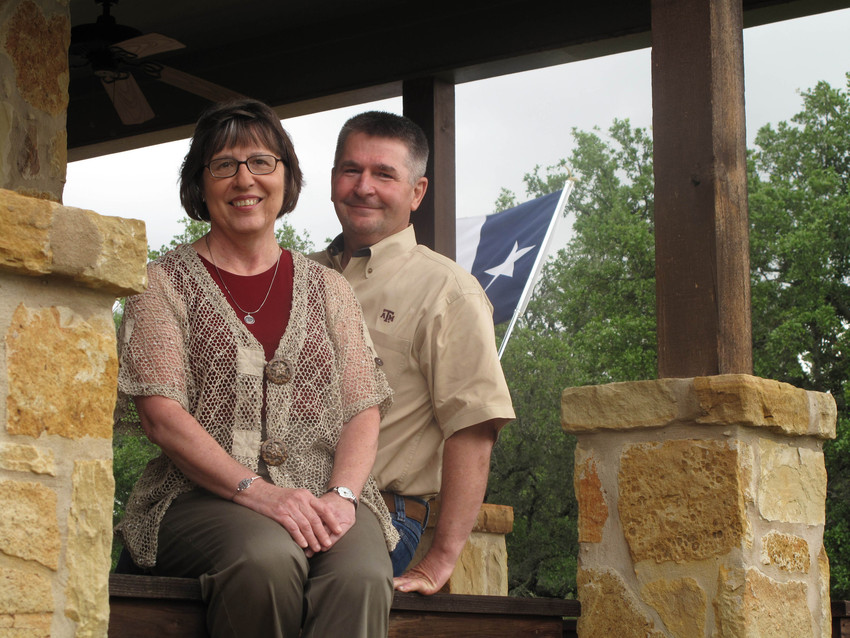Sandy and Les Pittman ’74 always dreamed of owning a piece of the Texas Hill Country.
In 2003 they purchased more than 500 acres between Llano and Fredericksburg, Texas, as an investment they could enjoy over the years with their friends and family. The Pittmans visited often, but once their sons Kyle ’01 and Jared ’03 graduated and formed families of their own out-of-state, their free time decreased, resulting in less time at the ranch. “As Sandy and I approached 60, the reality of our mortality became apparent and we wanted to give more attention to our parents and grandchildren,” Les Pittman said. “We had to make decisions about where we could and should spend our time.”
A Trustworthy Solution
The Pittmans reduced the ranch to a more manageable size by selling one parcel of acreage. After deciding to keep the 204 acres on which they had built a house, the couple established a charitable remainder unitrust (CRUT) through the Texas A&M Foundation with the remaining 160 acres. “When you sell highly appreciated real estate outright, you generate significant capital gains that lead to capital gains taxes,” Les Pittman said. “By using the charitable remainder unitrust, we were able to avoid the capital gains taxes and receive a significant income-tax deduction.” The trust will benefit the couple with annual payments and, after their lifetimes, it will provide 20 years of payments to their sons. At the trust’s termination, the remaining balance will support the program of their choice at Texas A&M.
“This charitable remainder unitrust fits our situation and needs perfectly,” Sandy Pittman said. “We were not rushed into an irrevocable gift use decision when we created the trust. Instead, we can decide exactly how we want to direct the funds for Texas A&M anytime we’re ready.”
Les Pittman says the decision to leave part of their Texas Hill Country ranch to the Texas A&M Foundation was an easy one. “Because of the structure of this endowed gift, we will be able to do something for others for a very long time. And we can enjoy the satisfaction of this decision today.”
How a Charitable Remainder Unitrust WORKS
- You transfer cash, securities or real estate into a charitable trust.
- The trust pays a percentage of the value of its principal to you and/or your beneficiaries. The trust principal is revalued annually.
- When the trust terminates, the remainder passes to the Texas A&M Foundation to be used for Texas A&M as you specify.
Charitable Remainder Unitrust BENEFITS
- You receive an immediate income-tax deduction for a portion of your contribution to the unitrust.
- You pay no immediate capital gains tax on the transfer and/or sale of appreciated assets.
- You or your designated beneficiaries receive payments for life or a term of years.
- You can make additional gifts to the trust as your circumstances allow and qualify for additional tax deductions.
- You can convert low-yielding, highly appreciated assets into a higher yielding diversified portfolio.
- In the case of real estate, you avoid the burden of selling your property.
- You have the satisfaction of making a significant gift that benefits you now and Texas A&M later.

Smart Planning
Maybe the Pittmans’ story hits close to home for you. You have saved money all your life, watched your wealth and investments grow, and now high taxes threaten to jeopardize your savings. Educate yourself and get advice from those who can help you: your attorney, your accountant and a gift planner.
A charitable remainder unitrust can help you avoid higher taxes while giving you additional benefits. When you fund a charitable remainder unitrust with an appreciated asset like stock or real property, no capital gains taxes are due at the time of the sale. Proceeds from the sale of the property are invested in the trust in a way that maximizes income for you. The trust can pay you (and/or others) for a term of years or for life. You get to decide which plan is best for you and your family. The charitable remainder unitrust also entitles you to a charitable income-tax deduction. Eventually, the trust assets will go to the Texas A&M Foundation to benefit Texas A&M University.
Ask us for an illustration and a discussion and then talk with your attorney about the benefits you can expect with a charitable remainder unitrust.
